Without a doubt, the keto diet, which is a low-carb, sugar-free diet, has become increasingly popular in recent years.
This means that instead of burning sugar for energy, the body switches to burning fat for fuel.
The main goal of this type of diet is to get into and maintain a state of ketosis so that the body can utilize its own fat stores as an energy source.
The keto diet also has many potential health benefits, including weight loss, improved mental clarity and focus, increased energy levels, and reduced inflammation.
Additionally, the diet can help improve insulin sensitivity and help with insulin resistance by increasing the body’s ability to burn fat for fuel.
Despite these benefits, those who abstain from sugar-laden foods may struggle to identify suitable low-carb sweeteners for their favorite baked goods and sweet treats.
Best Sugar-Substitutes
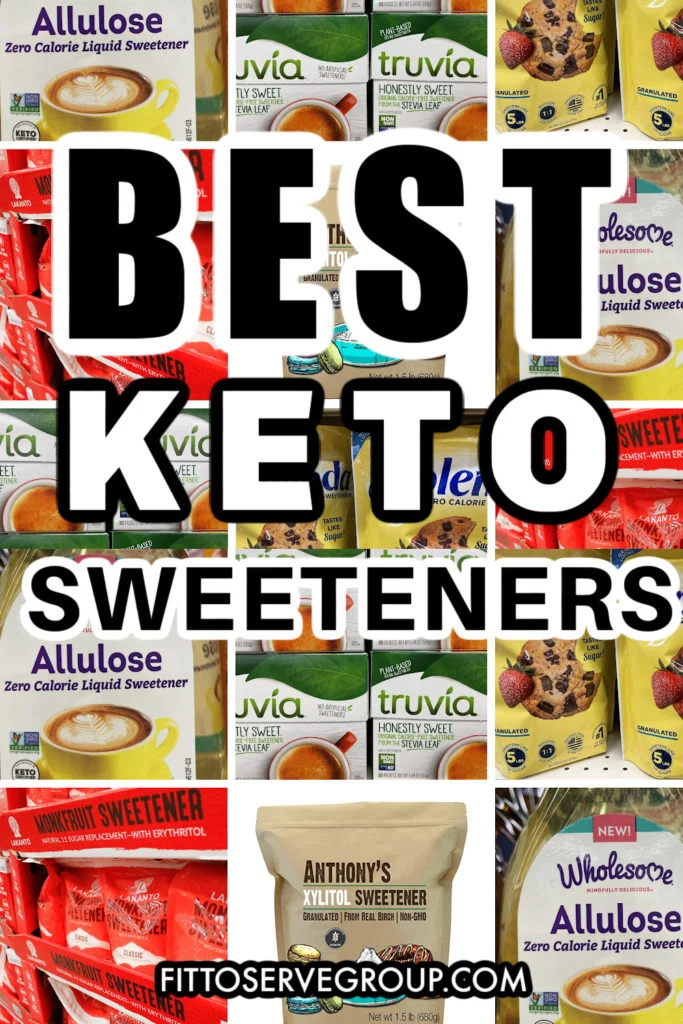
Choosing the best sugar alternatives can seem daunting because there are a variety of sweeteners available on the market that are both low-carb and keto-friendly.
Sugar cravings can be managed with alternative sweeteners in small doses.
Instead of real sugar, which can cause blood sugar spikes, a keto sugar substitute is a good option when you are monitoring blood glucose levels while on a low-carb diet.
In this post, I’ll be sharing what I consider to be the best keto-friendly sweeteners.
As someone who uses low carb sweeteners regularly to produce the recipes for our site, I have years of experience, making it easy to share my top picks.
Monk Fruit Extract
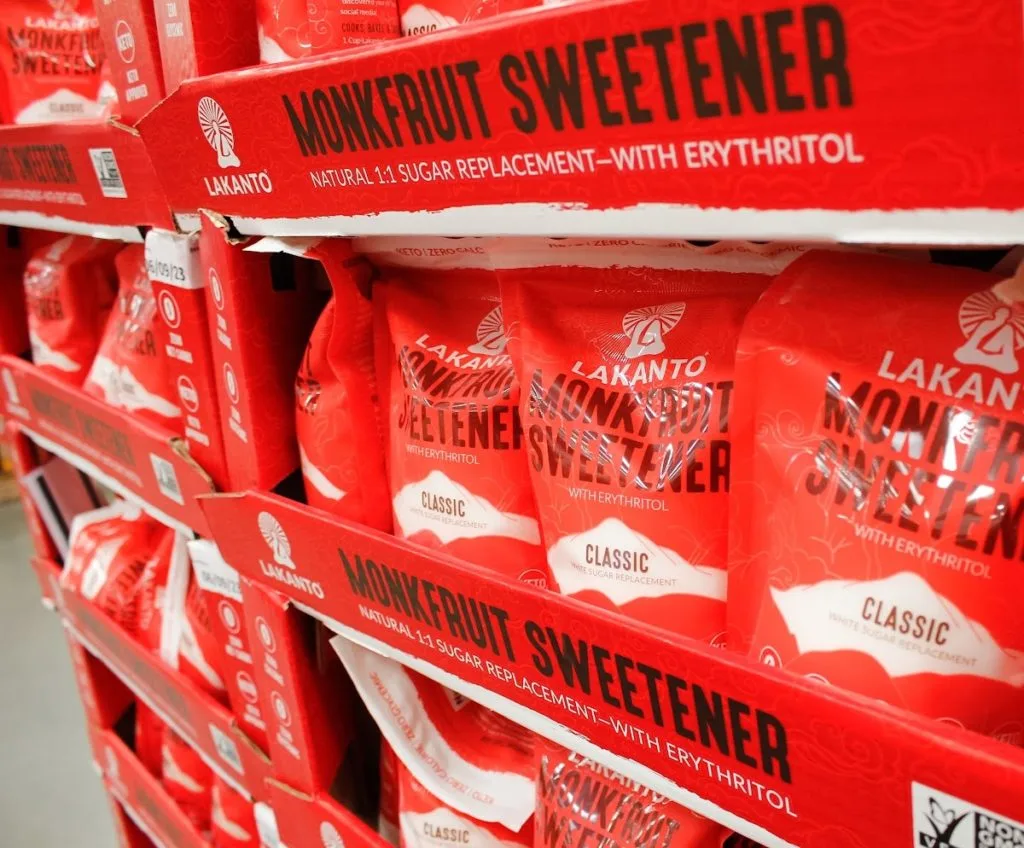
Disclosure: Some of the links below are affiliate links, meaning at no additional cost to you, I will earn a commission if you click through and make a purchase.
Monk fruit extract comes from the monk fruit ( luo han guo) which is a melon-like fruit that grows on a vine and is native to parts of China and Thailand.
It is calorie-free and has no impact on blood sugar levels, making it an excellent choice for those on a ketogenic diet looking for a sugar substitute.
Monk fruit is also up to 200 times sweeter than sugar, so a little goes a long way.
It has zero carbs, zero calories, and zero sugar and comes in several forms, including liquid, granules, and powder.
It is often combined with erythritol, as is the case with Lakanto Monk Fruit, which gives it a superior texture.
A monk fruit erythritol blend sweetener is ideal for recipes where you want to add sweetness without adding extra calories or carbs.
I am not a fan of using raw monk fruit in recipes that require more than a couple of teaspoons. I feel monk fruit in its raw state is best for sweetening hot or cold beverages.
I recommend Lakanto Monkfruit in keto baking, as it comes very close to the texture and flavor of sugar and is my go-to option.
Xylitol
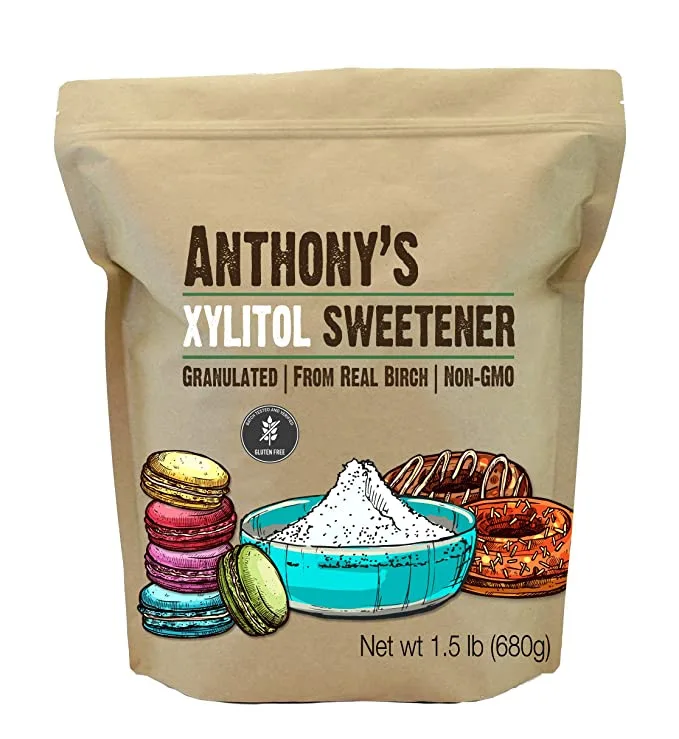
Xylitol is another sugar alcohol that occurs naturally in some fruits and vegetables. It has about the same sweetness as sugar but only half the calories.
It is considered a weight-loss-friendly sweetener since it contains 40% fewer calories than sugar.
For people with diabetes, prediabetes, obesity, or other metabolic problems, xylitol can be an excellent alternative to sugar.
Xylitol does not raise blood sugar levels or insulin levels but can cause digestive issues if consumed in large amounts.
Both erythritol and xylitol are non-acidogenic sweeteners, meaning they can effectively reduce the acid produced by oral bacteria that may corrode tooth enamel.
However, xylitol is toxic to dogs and should be used carefully around them. Even a very small amount can be detrimental.
In people, xylitol does not stimulate the release of insulin from the pancreas, but it’s a different scenario for dogs.
I am not a fan of this sweetener in baked goods, mainly because it can cause gastrointestinal discomfort but also because it absorbs more moisture than other sugar substitutes.
Your baked goods will bake faster with xylitol and cause them to be dry.
Stevia
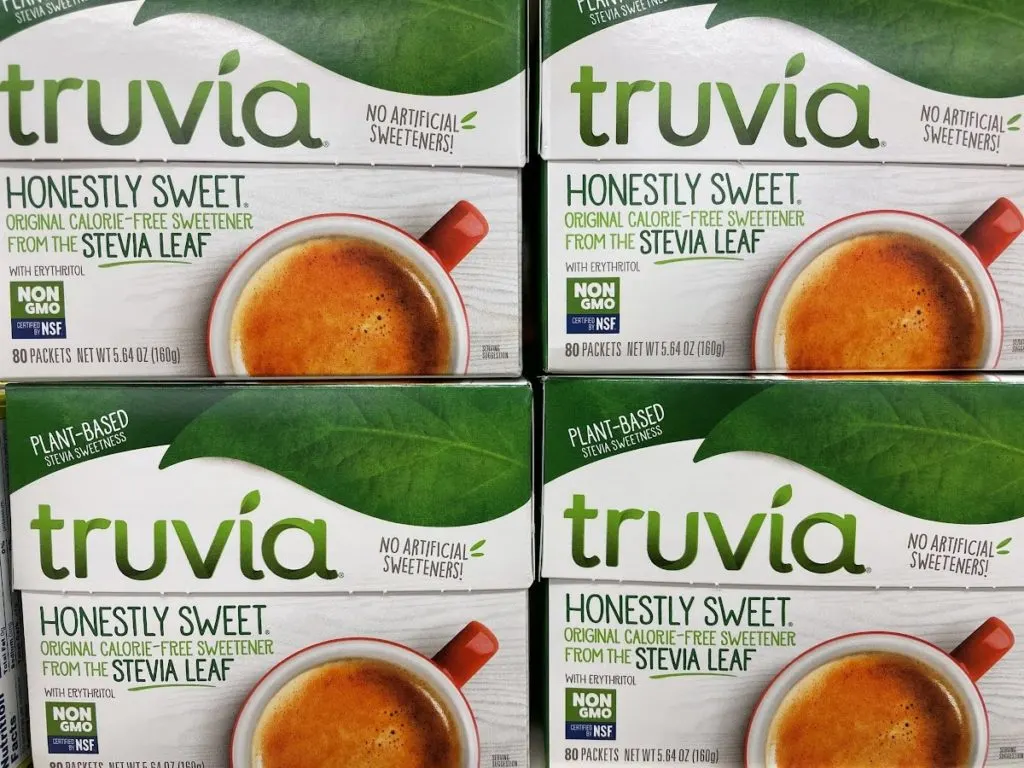
Stevia is a natural sweetener that comes from the leaves of the busy shrub plant. It is native to Brazil, Argentina, and northeastern Paraguay.
It is calorie-free and has zero glycemic impact, making it an excellent choice for those on a keto diet.
Stevia is also 200-300 times sweeter than sugar, so a little goes a long way.
Stevia is a great all-purpose sweetener that can be used in a variety of applications. It’s handy in hot drinks such as coffee, tea, and cold beverage where you want to add sweetness without adding extra carbs or calories.
Stevia is also great for baking and cooking as it doesn’t break down at high temperatures like some other sweeteners do.
While stevia is generally considered safe for most people, some may experience side effects such as bloating, nausea, or dizziness.
Would you like to save this?
Stevia is in the Asteraceae/Compositae plant family. This is the same family that includes ragweed. In theory, people who are sensitive to ragweed may also be sensitive to stevia.
Additionally, some people find that stevia has a bitter aftertaste that can be off-putting.
Stevia may be challenging to use in keto baked goods and desserts since it is quite sweet.
I recommend Pyure a stevia/erythritol blend rather than pure stevia because the added erythritol gives structure to the sweetener and makes it easier to use.
That being said, for many, the intense bitter aftertaste makes it challenging to use. I do not recommend its use in recipes that are chocolate-based, as it seems to make the aftertaste even stronger.
Allulose
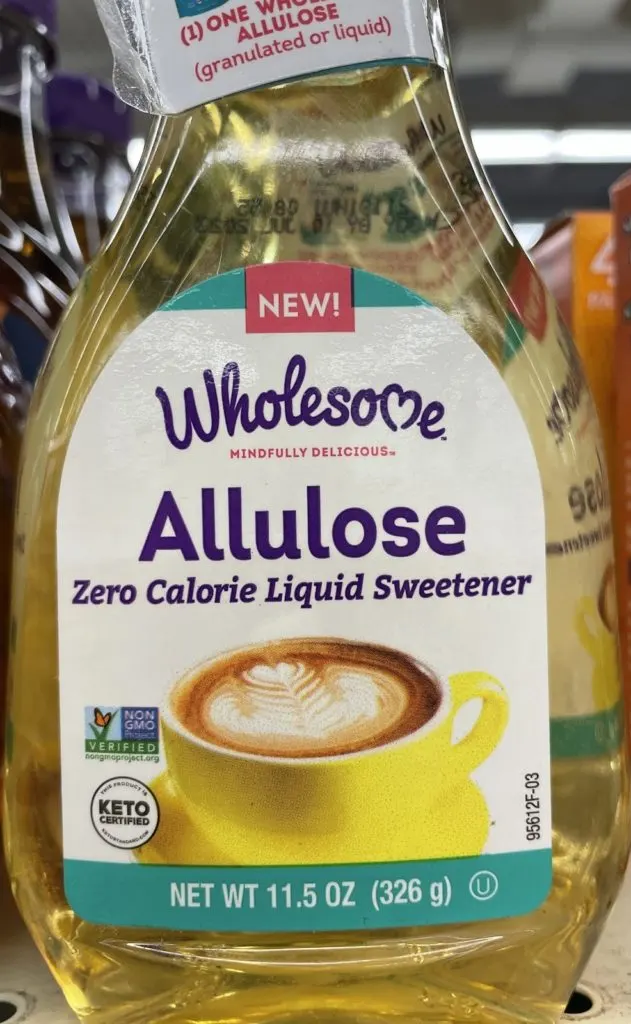
Allulose is a rare natural sweetener that occurs naturally in small quantities in wheat, figs, raisins, and jackfruit.
It tastes like regular table sugar but has only 10% of its calories and does not raise blood sugar levels or insulin levels.
It is 70% as sweet as sugar and has a similar flavor profile. It also does not have the bitter aftertaste that is common in artificial sweeteners.
Chemically, allulose looks a lot like fructose which is naturally found in fruits. The main difference is that it is not absorbed into the body and does not contribute to calorie intake.
When consumed in large quantities, allulose may cause some stomach discomfort, so keep that in mind.
I like using allulose when I am making a recipe that has a sauce, like my keto flan or the glaze for my keto ham recipe. It is less likely to crystallize, and it browns like real sugar.
Erythritol
Erythritol is a sugar alcohol or polyol that occurs naturally in certain fruits and fermented foods.
It has about 70% of the sweetness of sugar but only 6% of its calories. Erythritol is unique from other sugar alcohols because it contains zero calories and is low in carbs, making it an ideal sweetener for those on the keto diet.
Some of the main benefits of erythritol-based sweeteners are that they do not raise blood sugar levels or insulin secretion and can contribute to oral health.
Erythritol inhibits the growth of a specific type of oral bacteria (Streptococcus mutans) which is associated with cavities, so it does not promote tooth decay.
It is considered non-acidogenic, which means they help decrease the amount of acid produced by the oral bacteria that can damage tooth enamel.
Not only does erythritol give food a sweet taste, but it also helps foods stay moist and fresh for longer.
I find that erythritol is an excellent sugar substitute for baking because it has a texture similar to sugar and doesn’t have the intense cooling effect that some other sugar alcohols do.
It’s also great for making no-bake low-carb desserts such as ice cream or cheesecake.
Erythritol is generally well-tolerated by most people and has no significant downsides. However, some people may experience digestive issues such as gas or bloating when consuming large amounts of this sweetener.
Recently, a study was published that claimed that this common sweetener was associated with an increase in heart attacks and strokes.
But before you decide to remove this sweetener from your diet, I urge you to reexamine the evidence.
Dr. Peter Attia has an in-depth article (More Hype Than Substance Erythritol And Cardiovascular risk) that details the problem with this study.
Sucralose
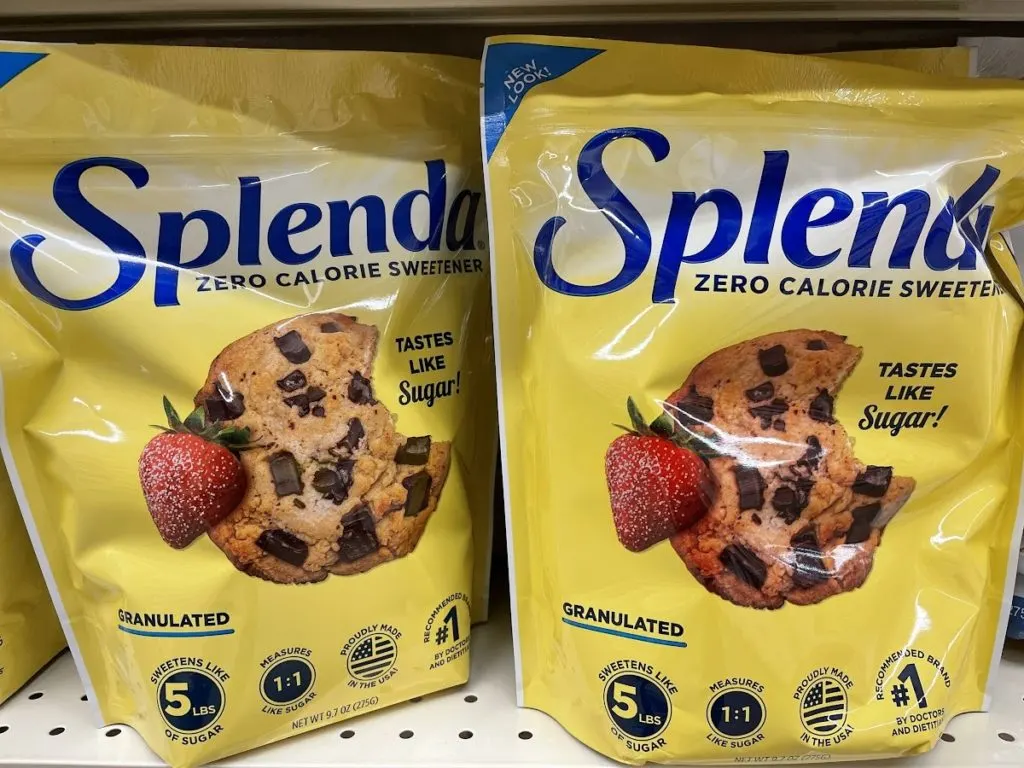
Sucralose, also known as Splenda, is an artificial sweetener made from sugar molecules.
But it’s important to note that sucralose is not sugar. It has the same form and consistency as sugar but with three of its hydroxyl groups replaced by chlorine atoms.
This unique structure safeguards against enzymes in the digestive tract from processing it – hence avoiding any unexpected spikes in your blood sugar levels!
It has the same sweetness as table sugar but only 5-10% of its calories and does not raise blood sugar or insulin levels.
It is important to note that sucralose isn’t a natural product and should be used in moderation while on the keto diet.
Some people find that the use of sucralose can hinder weight loss. I recommend that you test to see if you are able to tolerate this sweetener before using it regularly.
Overall, sucralose can be a helpful tool for those on a sugar-free diet looking to satisfy their sweet tooth without added carbs.
Sucralose is generally considered safe for most people. However, some studies have suggested that consuming large amounts of sucralose may have negative effects on gut health.
Additionally, some people may experience adverse effects such as headaches or digestive issues when consuming sucralose.
In conclusion, there are many natural sweeteners available that are suitable for those on a keto diet. Stevia, erythritol, monk fruit extract, xylitol, and allulose are all great options with different benefits depending on your preferences and needs.
Remember to always check labels when purchasing sweeteners, as they may contain hidden sources of carbs or sugars that could derail your ketogenic goals, and always aim for brands that do not use GMO’s.
